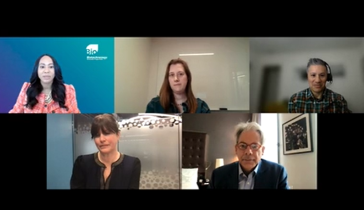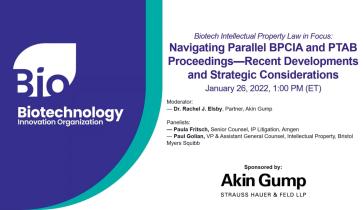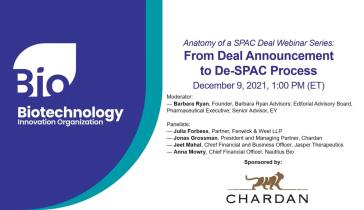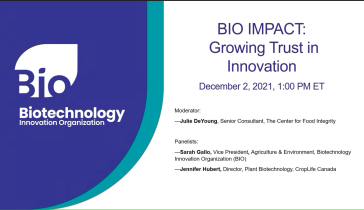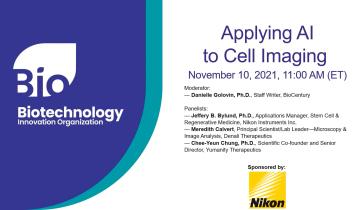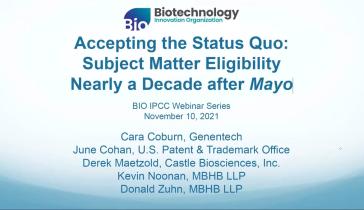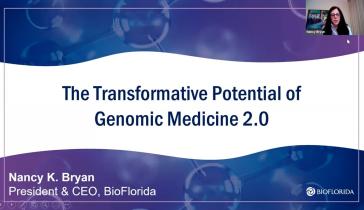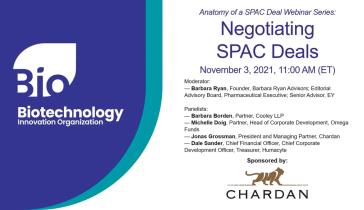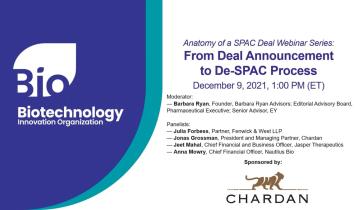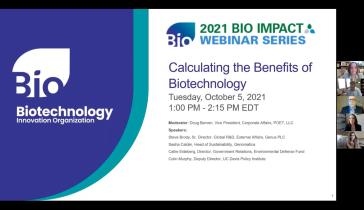September 7, 2023
Speakers: Bernard V. Fallon, Mackensie Vernetti
The BIO Investor Forum is back! Join us at the Hilton San Francisco Union Square from October 17-18 for two days of thought-leadership, partnering, and insight into investment trends and the priorities of venture-stage growth and emerging public biotech companies.
Attend this…
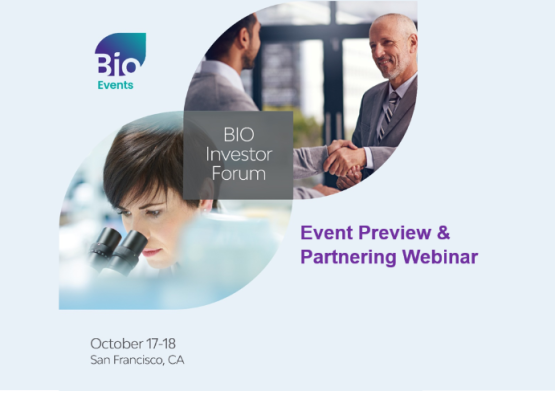
September 13, 2023
Speakers: Phyllis Arthur, John Billington, Brian Dziewa, Ryan Morhard, Justin Pine, Bart Van Vooren
Join us for an important webinar for those invested in the broader biotech industry, "Understanding the Business Implications of Global Access and Benefit Sharing Policies." Tailored for members of BIO and a diverse community of stakeholders, this high-level session focuses on…

September 14, 2023
Speakers: Abe Bassan, MS, Peter Pellerito, Gayatri Varma, PhD, James Zanewicz
With the majority of biological studies conducted in academic settings but nearly all innovative new drug clinical trials sponsored by industry, improving translational research success rates for commercialization is critical to bringing new treatments to patients. Surveys of…


It's been one year since the passage of the IRA. The Centers for Medicare & Medicaid Services has moved forward implementing the law's various provisions, including the new Medicare negotiation program and the redesign of the Medicare Part D benefit. Learn the latest developments from our panel of experts, including how the IRA is impacting biopharmaceutical companies today.

The Cell and Gene Therapy (CGT) Science Series is a quarterly seminar series focused on scientific topics related to cell and gene therapy products. The CGT Science Series is intended to foster scientific exchange between the Biotechnology Innovation Organization (BIO), the American Society of Cell & Gene Therapy (ASGCT), and Center for Biologics Evaluation and Research (CBER) review staff on a variety of topics that span the CGT product lifecycle. The seminars are planned as 60-minute virtual webinars featuring a speaker from one of the three organizations. The CGT Science Series will enable a deep dive into a specific technical and/or scientific area. Topics in the series may include but are not limited to, nonclinical, CMC, clinical, or post-market phases of development related to CGT product lifecycle.
Moderator:
– Anne-Virginie Eggimann, Tessera
Opening Remarks:
– Cartier Esham, Chief Scientific Officer, Biotechnology Innovation Organization (BIO)
Speaker:
– Jing Liao, Director, Vector Development and Operations, Alexion Pharmaceuticals

This Biotechnology Innovation Organization (BIO) webinar explains that the days of the one-page marketing slicks are over, as companies and investors now expect brief “Pitch Decks” when engaging in conversations with them. This diverse panel of experts explain how to make an effective pitch to them, so that you can tailor your BIO partnering strategy to achieve a maximum ROI.

During this webinar, panelists discuss strategies for biotechnology companies to manage economic downturns and weakened investor interest in the biotech industry. Our expert panel of industry leaders share their insights and experiences on how to maintain momentum and emerge stronger during periods of economic uncertainty.
This webinar is designed to provide practical advice and actionable strategies that can be implemented immediately. The panel covers the following topics:
• Effective communication and investor relations strategies during economic downturns
• Actions biotechs can take to cut costs without sacrificing innovation and growth
• How to pitch to investors during weakened investor interest periods

U.S. Department of Justice (DOJ) statistics suggest that enforcement will be a top government priority in 2023, including for pharma/life sciences. Warning or untitled letters from the U.S. Food and Drug Administration (FDA) will serve as ammunition for DOJ cases. Statements about product safety will be heavily scrutinized.
Do you know what to watch out for? Has your company trained its employees and marketing agencies on how to appropriately implement the requirements for promotion? What activities require extra vigilance? The prior downturn in enforcement can be linked to the development of a response to COVID-19, which diverted government resources across the board. Now trends suggest the FDA, DOJ, and Office of Inspector General (OIG) will return to active healthcare enforcement in 2023 for violations of the Food Drug and Cosmetic Act (FDCA), False Claims Act and the Anti-Kickback Statute in part attributable to the goal of obtaining additional financial recoveries.
This webinar hosted by the Biotechnology Innovation Organization (BIO) has these learning objectives:
—Understand the current trends for government enforcement
—Dissect the compliance implications of increased enforcement on the industry
—Identify specific cases that are clear examples for company concern
—Isolate the key principles for avoiding violations
ON-DEMAND
COMMUNICATIONS COMPLIANCE COURSES
FOR PROFESSIONAL DEVELOPMENT
Special Discount
Buy 2 course registrations, Get 1 FREE
through May 15, 2023
in honor of this webinar!
The Center for Communication Compliance (CCC) helps biopharmaceutical companies achieve efficient, compliant innovation in a digital world through its proprietary on-demand business solutions in education, technology, and change management.
The CCC eLearning System has set an unmatched standard for confirming regulatory competency through engaging mastery tests and expert education content across more than a dozen course options.
SEE COURSES LIST
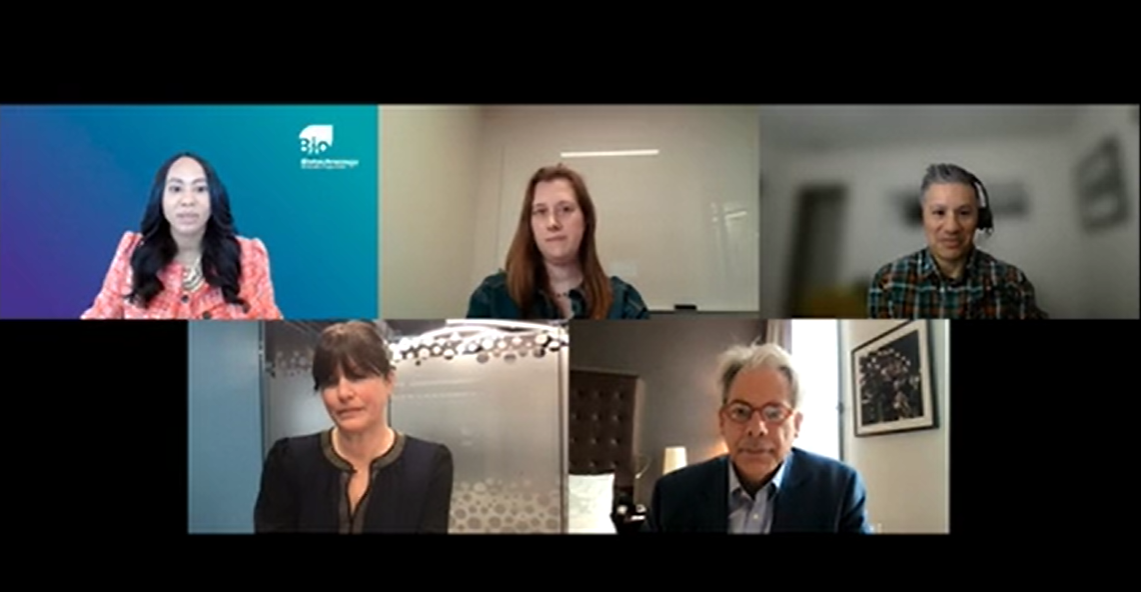
The COVID-19 pandemic has transformed the way we work, and the biotech industry is no exception. As the world recovers, companies are navigating a new landscape of changes in HR, office and lab space, and real estate. To help you understand and prepare for these changes, the Biotechnology Innovation Organization (BIO) convened this webinar, The New Normal: Post-COVID Workforce and Office Trends.
In this webinar, we cover:
--The changing biotech real estate market, rise of innovation districts, and what it means for your company
--How HR policies have evolved in response to the pandemic, including remote work and employee support programs
--Evolving workforce talent demands Changes in office and lab space design to ensure employee safety and productivity

With the majority of biological studies conducted in academic settings but nearly all innovative new drug clinical trials sponsored by industry, improving translational research success rates for commercialization is critical to bringing new treatments to patients. Surveys of academic tech transfer offices and the biopharma industry executives working on such alliances cite as obstacles two highly controllable factors: disagreement about alliance performance metrics and misalignment of deal terms priorities. This panel will foster conversation about best practices for removing such obstacles to accelerate more promising ideas into clinical development for patients.

Biotech Intellectual Property Law in Focus: Webinar Series
Navigating Parallel BPCIA and PTAB Proceedings – Recent Developments and Strategic Considerations
This panel hosted by the Biotechnology Innovation Organization (BIO) discusses relevant case law and trends in BPCIA litigation and related PTAB proceedings, followed by a “roundtable” on the factors that may influence litigation strategy, early case resolution, and market entry.

A private biotech that announces a definitive agreement with a SPAC jumps into the public investor spotlight and faces that attention with fewer guardrails than the IPO process, plus a need to transform board, investor, and regulatory relations. Given that most SPAC merger deals also involve follow-on PIPE investment rounds or other transactions, the full fundraising benefits of the deal strategy require a smooth de-SPAC process that a private biotech would never have encountered before. View this webinar to learn best practices for navigating from SPAC deal announcement through de-SPAC process to regular life managing a publicly traded company.

Innovation flourishes when science and consumer values are aligned and complement one another. Regulatory approaches towards innovative products cannot exist in isolation. They should be supported by credible transparency measures. A proactive approach to transparency stands to build trust and foster an inclusive environment to address our most pressing societal, nutritional, and environmental concerns. This webinar will explore the meaningful – and sometimes unexpected- actions and partnerships that are growing trust in the innovation ecosystem and delivering access to innovations that benefit people and the planet.

New algorithms and optical system improvements are expanding the frontier of cell imaging quality. Artificial intelligence techniques enable better visualization of cellular mechanisms in a wide number of applications and across multiple scientific disciplines, including advancing neurological research. View this Biotechnology Innovation Organization (BIO) webinar as it highlights how AI and imaging are being used to improve our understanding of complex and notoriously intractable disorders such as Alzheimer’s, Dementia, and related diseases. Learn from the following imaging and therapeutic development experts as they answer audience questions during the session.

Accepting the Status Quo: Subject Matter Eligibility Nearly a Decade after Mayo
This Biotechnology Innovation Organization (BIO) webinar discusses the reality that almost a decade after the Supreme Court’s decision in Mayo v. Prometheus, the current subject matter eligibility standard has become the status quo with little prospect for change. Speakers will discuss how innovators can best protect their technology under these circumstances, how subject matter jurisprudence has impacted the patent process, and whether incremental changes could improve the situation.

The Biotechnology Innovation Organization (BIO) and BioFlorida present "The Transformative Potential of Genomic Medicine 2.0." Genomic technologies create powerful tools that have the potential to diagnose, treat, and permanently subdue many human diseases. Technologies such as gene therapy, gene editing, and CRISPR are just some of the newest terms as researchers and clinicians work on new approaches to develop lifesaving, disease-altering treatments. This session provides in-depth discussion regarding how treatment is changing in rare diseases and the sickle cell community, and how public and private payers are approaching coverage of these crucial treatments. The session opens with statements from two legislators, then the panel features two patients and an expert in alternative payment models to provide information and answer questions from policymakers.
Representative Sam Garrison
Florida House of Representatives
House Health and Human Services Committee Republican Majority Whip
Senator Bobby Powell
Florida State Senate
Legislative Black Caucus Chair

Nearly 30 life science SPAC deals have closed or announced definitive agreements within the past year, helping private companies access new capital and public markets quickly. However, even recent traditions in SPAC deal terms continue to evolve because of statements from regulators regarding the accounting for warrants, shifts in investor expectations, and the availability of PIPE deal supporters, among other factors. View this Biotechnology Innovation Organization (BIO) webinar's discussion of best practices for negotiating SPAC deal terms in today’s market to maximize raising capital to serve biomedical innovation. Learn from the following deal-making experts as they answer audience questions during the session.
This session is part of the "Anatomy of a SPAC Deal" Webinar Series, sponsored by Chardan.

More than 60 public Special Purpose Acquisition Companies (SPACs) are currently seeking life science companies for merger deals. Join this Biotechnology Innovation Organization (BIO) webinar to learn which financial, scientific, and managerial characteristics are most appealing to SPAC sponsors and the critical factors biotech management teams should prioritize in reviewing SPACs as potential fundraising sources. Learn from the following deal-making experts as they answer the moderator's and the audience's questions during the session.
This session is part of BIO's "Anatomy of a SPAC Deal" Webinar Series, sponsored by Chardan.

Calculating the Benefits of Biotechnology Climate change is a clear and present danger to society. Industries and governments are taking action to confront this crisis, committing to sustainability goals that reduce environmental impact and improve the health and well-being of communities. To be confident in sustainability claims, it is critical to accurately calculate the environmental benefits of biotechnologies and how that value transfers through complex supply chains. Our BIO Impact webinar will explore efforts to promote consistent sustainability accounting, as well as highlight BIO members’ transformative innovations and the partnerships & collaborations that are leveraging the demands of climate mitigation and propelling a resilient biobased economy of the future.
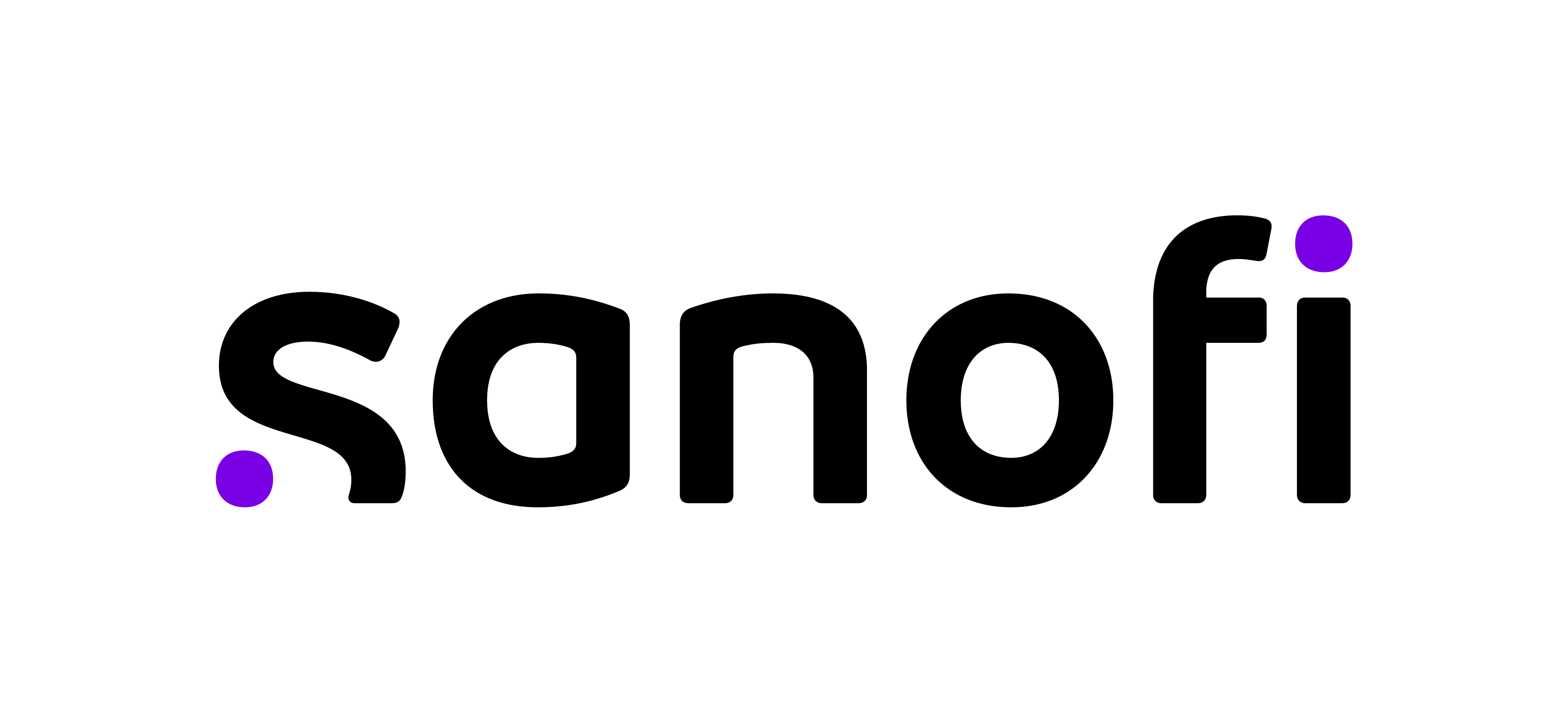




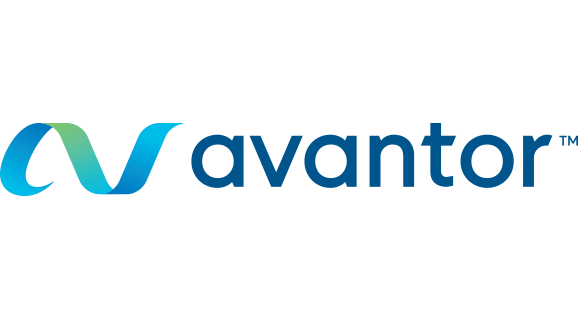

.png)








